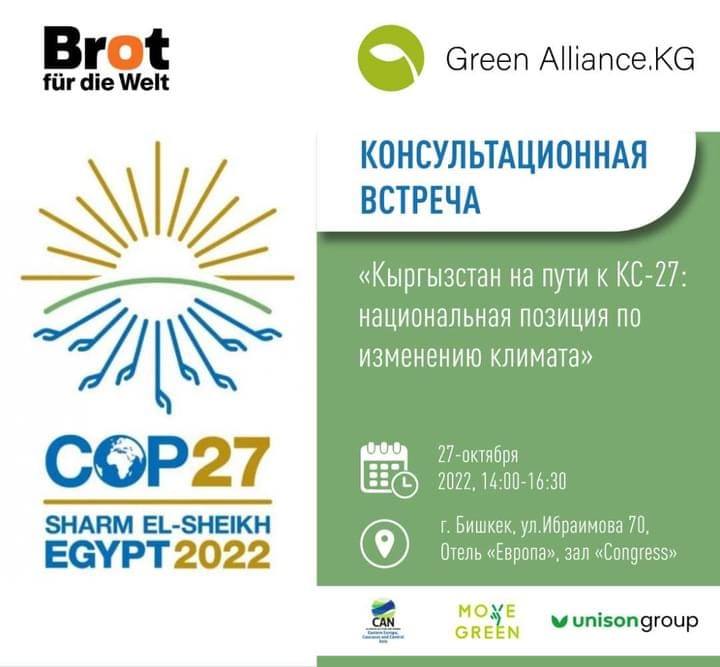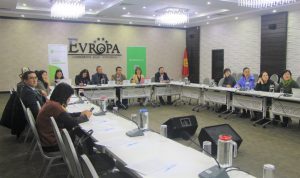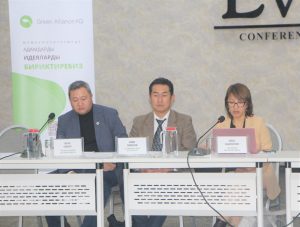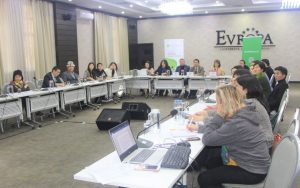
NATIONAL POSITION OF THE CIVIL SOCIETY OF THE KYRGYZ REPUBLIC
on the occasion of the 27th Conference of the Parties to the UNFCCC, to be held from 6 to 18 November 2022 in Sharm el Sheikh, Egypt
The mission of “Green Alliance.KG”, an association of legal entities, is to mobilize the general public, civil society and stakeholders of Kyrgyz Republic in order to implement the principles of green economy and sustainable development on local and national levels. Green Alliance KG includes some 50 members from civil society, private organizations and individual experts in order to unite the power, and efforts of society in line with Alliance’s mission.
The organization has held a public consultation to prepare unified position of the public on the occasion of the 27th Conference of the Parties (COP27) of the UNFCCC on the necessary climate action at the country level and the participation of the Kyrgyz Republic in international climate negotiation processes. We appeal to the President and the Cabinet of Ministers of the Kyrgyz Republic with a suggestion to take urgent actions to improve the climate and social situation in the country, as well as to recognize the significant role of civil society as meaningful partner in this process.

The world has changed since the parties last met in Glasgow, UK in 2021. In 2022, our country is facing challenges such as increasing climate threats and cross-border military conflicts leading to exacerbated socioeconomic conditions.
The Kyrgyz Republic is one of the most vulnerable countries in the world to climate change, and we are already facing the consequences of climate change, which will be exacerbated by such problems as intensive melting of glaciers, lack of water resources, energy security risks, degradation of ecosystems, increasing poverty and inter-ethnic conflicts, etc. Given that agriculture is a key sector of the economy, the consequences of climate change pose a serious threat to the country’s food security.
A relevant issue in the upcoming COP-27 negotiations will be financial compensation for losses and damages from the climate crisis. Developing countries have made it clear that they expect a financing mechanism for loss and damage at COP-27. In light of the current global challenges with the provision of international financial support and the collection of funds up to 100 billion USD annually to achieve the targets of the NDCs by 2030 – 2050.
Cabinet of Ministers of the Kyrgyz Republic, as we believe, needs to assess prudently the country’s capacity to comply with the provisions of the Paris Agreement on climate change.
We welcome the fact that in 2022 the Kyrgyz Republic joined the Forum of Vulnerable Countries, and call for active support of the Payment Overdue campaign for loss and damage compensation, which the Coalition of Vulnerable Countries established within the framework of COP-27.

Taking into account the above, we expect that the Cabinet of Ministers of the Kyrgyz Republic in its speeches within the framework of COP 27 will emphasize (pay great attention to):
- The importance of international assistance to the country in adaptation to climate change, financing recovery from loss and damage – harm caused by climate change that are irreversible or cannot be adapted to;
- the special role of the Kyrgyz Republic in water supply in the Central Asian region, which is necessary to achieve the goals of sustainable development, energy and food security, favorable microclimate, etc.
New Ministry of Natural Resources, Environment and Technical Supervision was created, as part of the 2022 public administration reform, with strong departmental functionality. However, we note the slow process of staff capacity building and the need for an agency or department for the state’s climate strategy. Climate Finance Center (CFC) under the Ministry of Natural Resources, Ecology and Technical Supervision of the Kyrgyz Republic, within the framework of its authority enshrined in its Charter, will not be able to develop and adopt strategic documents on the climate agenda, and to lead the work on their formation. Currently, the national policy for adaptation and integration of the country to climate change is being developed by some international executive agencies, with the full or partial self-involvement of government agencies. We believe that the leadership and full involvement of state bodies in the development of climate policy is important for the successful implementation of programs and projects.
Since the establishment of the National Coordinating Council on Sustainable Development and Climate Change in April 2022, only one meeting has been held to date. We expect that this Council should become an effective mechanism for realizing high political will in the implementation of climate programs. We note with regret that representatives of civil society were not included in the National Coordinating Council, which contradicts the spirit of partnership and transparency in decision-making processes.
In connection with the all mentioned above, we urge the Cabinet of Ministers of the Kyrgyz Republic to express its political will and to:
– develop independently a National Policy on Climate Change (“road map”) in order to fulfill obligations under the Paris Agreement on Climate Change, ratified by the Kyrgyz Republic in 2019;
– integrate issues of real adaptation to climate change into all National Sustainable Development Programs of the country and sectors of the economy;
– adopt the law “On Glaciers”, which will preserve the reserves of mountain water resources and adapt future generations to climate change;
– create a reliable and sustainable system for monitoring and evaluating the implementation of strategic programs and projects on adaptation to climate change, with the participation of civil society;
– create a unified institutional intra-agency database for information exchange and define procedures for data storage and exchange to ensure efficient document flow within the agency and to preserve work in the face of staff turnover;
– develop socially-oriented indicators of climate change adaptation programs and strategies to analyze the effectiveness of their impact on the sustainable development of the country, while placing the quality of life and human health (especially considering the interests of young people, women, rural households, vulnerable communities and other social groups) at the center of the climate policy of the Kyrgyz Republic;
– reduce support and subsidies for fossil fuel projects, due to increased greenhouse gas emissions, air pollution during the heating season, and the lack of methods to process combustion waste, which leads to soil contamination;
– to activate financial opportunities in the country in favor of renewables and energy efficiency programs with a focus on supporting the least protected segments of the population;
– develop economic sectors with low-carbon emissions and minimal impact on the environment, introducing the principles of circular economy (sustainable consumption and production) and developing environmentally friendly technologies in agriculture, industry, waste management, industrial and civil construction and transportation;
– provide direct access to concessional financing to support vulnerable small-scale farming, women and youth entrepreneurship, rural populations living in climate risk zones to adapt to climate change, food security, water and energy problems;
– to activate the work of public supervisory boards under government bodies to strengthen the transparency and accountability of their activities in the field of climate change.
Civil society expresses its hope for the active participation of the delegation of the Kyrgyz Republic in international negotiations within the framework of plenary sessions and meetings of thematic working groups at UNFCCC COP 27, including:
– participation in the work of the platforms of the Warsaw International Mechanism for Loss and Damage from Climate Change Impacts and the Koronivia Joint Work Program (KJWA) related to agriculture (improvement of soil carbon, soil health and fertility of pasture and arable land, and integrated systems, including water management);
– participation of the Kyrgyz Republic in meetings of the Convention’s subsidiary bodies – the Subsidiary Body for Scientific and Technical Advice and the Subsidiary Body for Implementation (SBSTA[1] и SB);
– initiating questions of electing the Kyrgyz Republic to the elected bodies of the UNFCCC, including membership in the Green Climate Fund and Adaptation Fund Council, while considering the possibility of nominating women to elected positions;
– participation in discussions on long-term climate change financing, the effectiveness of climate change financing, including the results and impact of allocated funding and its mobilization, the provision of financial and technical support to developing country Parties in their mitigation and adaptation actions;
– participation in the consideration of Parties’ proposals for urgent amendments to the UNFCCC relating to the interests of Kyrgyzstan;
– interaction with delegations of other countries in negotiating groups defending, including, the interests of small mountain countries and landlocked countries;
– the possibility of joining the “Santiago Network”, which aims to become the “implementation mechanism” of the Warsaw International Mechanism, helping developing countries access to resources and expertise to prevent, minimize and eliminate loss and damage on the ground;
– search for opportunities to increase research potential in the country, the implementation of scientific and technical projects and the promotion of science-based and innovative developments and technologies in the process of government decision-making;
– participation of the delegation in sessions on sustainable cities and presentations of city plans of the Kyrgyz Republic on energy efficiency, transportation, internal migration and in general, urban infrastructure and environmental safety in cities.
We expect that the Cabinet of Ministers of the Kyrgyz Republic will publish its clear position on the main issues of the COP-27 agenda, prepared with the participation of all stakeholders before the conference. And the document will be presented to the international community at the official level.
For their part, representatives of the civil society express their readiness to cooperate with government bodies of the Kyrgyz Republic in discussing the above provisions of the Position, as well as
- to actively participate in the COP-27 in Sharm el-Sheikh (Egypt), to interact with the official delegation of the KR on the above-mentioned positions;
- raise public awareness and support large-scale information campaigns on climate change impacts, possible adaptation measures through traditional knowledge, and mitigation measures;
- increase cooperation with government bodies responsible for studying, observing, predicting, and responding to climate change;
- unite and consolidate civil society’s position on climate change, and improve constructive interaction with government bodies;
- actively participate in public discussions of draft laws and preparation of recommendations on the integration of climate change issues into national policy;
- actively participate in the implementation and monitoring of national and international projects on climate change, and pay special attention to transparency of funding and reporting mechanisms;
- conduct independent and joint research on various aspects of climate change policy (health, adaptation, mitigation, etc.);
- study and facilitate the collection of other countries’ experiences in combating and preventing climate change (conferences, side-events, etc.).
[1] https://unfccc.int/process/bodies/subsidiary-bodies/sbsta
